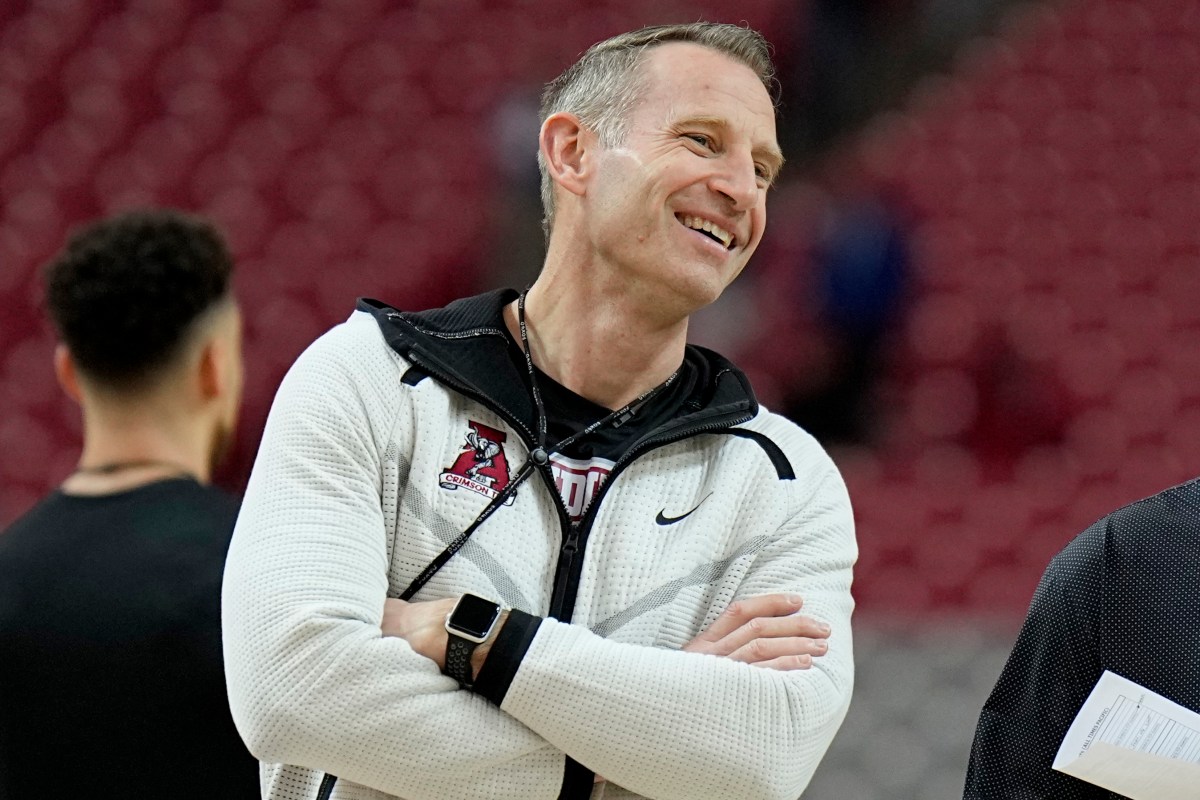GLENDALE, Ariz. (AP) — The longer Nate Oats coached at Romulus High School outside of Detroit, the more comfortable he felt with his position in the coaching hierarchy.
Oats had always pictured himself as a Division I college coach, yet he had built a top-tier program at Romulus and his three daughters grew up in the area. Moving them for a chance at a job that might last just a few years didn’t seem all that appealing.
Bob Hurley’s success at St. Anthony in New Jersey also put him more at ease with sticking around at Romulus. Hurley had built a Hall of Fame career while earning respect across the basketball world, remaining a high school coach through his lengthy career despite college programs constantly trying to lure him away.
“I realized I could stay here and be a very successful basketball coach and be happy with it,” Oats said. “Seems like every time you kind of get that way in life, a pretty good opportunity comes up.”
Oats’ opportunity came in 2013, when then-Rhode Island assistant Bobby Hurley showed up to watch a recruit, became impressed with Oats and later hired him as an assistant when he became the head coach at Buffalo.
Now, Oats is one of three coaches with roots in the high school ranks coaching in the Final Four this weekend.
Dan Hurley got his start at Saint Benedict’s Prep in New Jersey before leading UConn to a national championship last season. N.C. State coach Kevin Keatts’ formative years included two early stints at Hargrave Military Academy in Virginia.
Purdue’s Matt Painter is the only Final Four coach with college-only experience, starting with an assistant job at Washington & Jefferson College in Pennsylvania after playing guard for the Boilermakers.
“Some of the best coaches in the world are high school guys,” Keatts said. “They’re doing the same thing we’re doing, but don’t make a lot of money doing it. They do it for the love of the game and I think that’s what’s special about it.”
Hurley fell into it naturally.
He grew up in an ultra-competitive environment with his father and brother, former Duke point guard and current Arizona State coach Bobby Hurley. Dan Hurley played three seasons at Seton Hall before starting his career at Saint Benedict’s.
In addition to coaching basketball, Hurley taught world history, health and driver’s ed. He also taught coed sex education classes, requiring the ability to control the classroom and keep the students captivated.
“It’s definitely helped me as a coach in the huddle,” he said.
That’s for sure.
Hurley turned Saint Benedict’s into one of New Jersey’s top high school programs, a stint that earned him the head coaching job at Wagner. From there, Hurley had a successful run at Rhode Island and now has UConn on the cusp of becoming the first team to repeat as national champions since Florida in 2006-07.
“Obviously, there’s opportunity at the high school level, through trial and error, without college pressure, to kind of work on your craft as a coach,” Hurley said. “You get to develop in every way as a coach.”
Keatts began his coaching career as an assistant at Southwestern Michigan College in 1996 before taking a job at Hargrave. He spent two years as an assistant, became the head coach and returned to Hargrave after a two-year run as an assistant at Marshall.
Hargrave went 263-17 in 10 seasons under Keatts.
Keatts went on to coach under Rick Pitino at Louisville, became the head coach at North Carolina-Wilmington and has been the Wolfpack’s head coach since 2017.
Those early days at Hargrave, which included driving the team bus and washing uniforms, gave him an insight into the recruiting process and shaped the coach he has become.
“I learned so much,” he said. “I learned how to recruit, but I was also able to watch some guys who came to recruit our guys and see how they interacted, what they did. I wouldn’t pass that experience for anything.”
Neither would Oats.
The job at Romulus had less pressure than if he had gone straight to college, allowing him to experiment without fear of being let go, even using a full-court press for an entire season. If it didn’t work and he got fired at Romulus, Oats could still work as a math teacher and be content.
Oats used the time to hone his coaching style and philosophy, setting the foundation for the success he’s now having at Alabama.
“I wouldn’t trade my route for anything because I got experience at that in different ways like a lot of these coaches don’t get,” Oats said.
AP March Madness bracket: https://apnews.com/hub/ncaa-mens-bracket and coverage: https://apnews.com/hub/march-madness


















